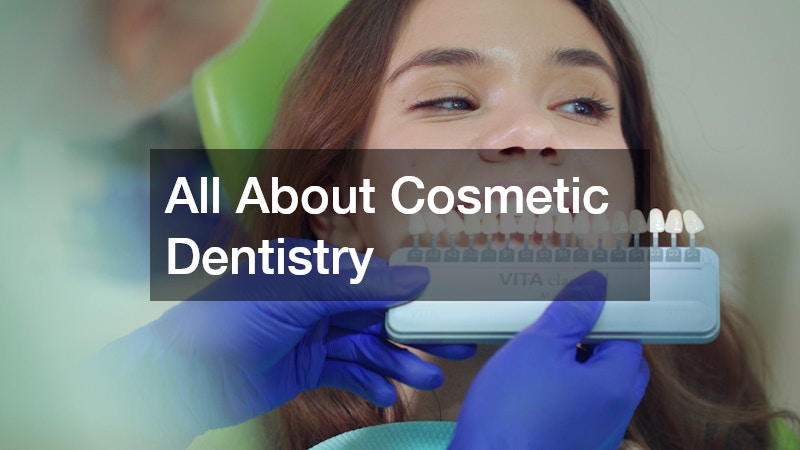
All About Cosmetic Dentistry
Introduction
This article explores the world of cosmetic dentistry, addressing common questions and providing insights into the various procedures and benefits it offers. Cosmetic dentistry focuses on improving the appearance of teeth, gums, and smiles, blending art and science to create beautiful results. Whether you’re seeking a subtle enhancement or a complete smile makeover, understanding your options is essential in achieving your ideal look.
What is Cosmetic Dentistry?
Definition and Scope
Cosmetic dentistry refers to dental work that aims to improve the appearance of the teeth, gums, and smile. Unlike general dentistry, which focuses primarily on oral health and hygiene, cosmetic dentistry emphasizes aesthetics and includes a variety of procedures designed to enhance smiles. The field encompasses various treatments tailored to different dental imperfections, ensuring that individuals can choose solutions aligned with their needs.
Common Procedures
There are numerous procedures classified under cosmetic dentistry, including teeth whitening, veneers, bonding, dental implants, and orthodontics. Each procedure has its unique features and serves distinct purposes, making it essential to consult with a cosmetic dentist to determine the best fit for your goals. Whether you need to correct discoloration, misalignment, or gaps, there is likely a cosmetic solution available.
Benefits of Cosmetic Dentistry
The psychological impact of a great smile can significantly boost self-esteem and improve social interactions. Many individuals report feeling more confident and attractive after undergoing cosmetic procedures, fostering both personal and professional success. Beyond aesthetics, some cosmetic treatments can enhance dental health, preventing future complications that could arise from untreated imperfections.
How to Choose a Cosmetic Dentist
When searching for a cosmetic dentist, it’s crucial to evaluate their qualifications, experience, and patient reviews. Look for professionals who have undergone specialized training in cosmetic procedures and hold relevant certifications. Additionally, scheduling consultations with potential dentists can help assess their communication styles, the clinic’s environment, and their approach to treatment planning.
Cost Considerations
The costs associated with cosmetic dentistry can vary widely based on the type of procedure, the materials used, and the dentist’s expertise. While some procedures may be more affordable, others, such as implants and full mouth reconstructions, generally require a higher financial investment. It’s important to discuss financing options with your dentist to ensure you can manage any costs associated with achieving your dream smile.
What Are the Most Popular Cosmetic Dentistry Procedures?
Teeth Whitening
Teeth whitening is one of the most sought-after cosmetic dental procedures, given its ability to produce dramatic results with minimal invasiveness. The process can be done in-office using professional-grade products or at home with dentist-provided kits, rapidly brightening discolored teeth. Individuals appreciate the convenience and effective results of teeth whitening, making it a popular choice for many.
Veneers
Dental veneers are thin shells made from porcelain or composite resin that are bonded to the front surface of teeth to enhance appearance. They can correct issues like chips, gaps, and severe discoloration, providing a highly aesthetic finish. The application process involves minimal tooth reduction and typically results in a natural-looking smile that can last for many years.
Bonding
Dental bonding is a procedure that involves applying a tooth-colored resin to fix imperfections, such as chips and cracks, or to improve the shape of a tooth. The process is relatively quick and can often be completed in one visit, making it a convenient option for many patients. Bonding is also a cost-effective solution for minor aesthetic issues without requiring extensive treatment.
Implants
Dental implants are a popular and effective solution for replacing missing teeth, consisting of a titanium post surgically placed into the jawbone. Over time, the implant fuses with the bone, providing a sturdy foundation for a crown that mimics the appearance of a natural tooth. With proper care and maintenance, dental implants can last a lifetime, making them a worthwhile investment for many individuals.
Braces and Orthodontics
Modern orthodontics offers a range of options beyond traditional metal braces, including clear aligners and ceramic braces that are aesthetically pleasing. These treatments can effectively address alignment issues in both adults and teens, providing options that fit various lifestyles and preferences. As an investment in long-term dental health, orthodontic treatment can also significantly enhance one’s smile.
Is Cosmetic Dentistry Right for Everyone?
Ideal Candidates for Cosmetic Procedures
Individuals considering cosmetic dentistry should have realistic expectations and a desire to enhance the appearance of their smiles. Good candidates typically have healthy teeth and gums, which are crucial for the success of most procedures. Those looking to address specific aesthetic concerns or who wish to improve their self-esteem often find cosmetic treatments particularly beneficial.
Age Considerations
Age can be a factor in seeking cosmetic dental work, with many adults turning to these procedures as they become more self-conscious about their smiles. While teens increasingly seek braces and teeth whitening, adults may be looking for solutions to restore their smile after years of wear and tear. Regardless of age, individuals should consult with a cosmetic dentist to discuss personalized treatment options.
Health Conditions Impacting Eligibility
Certain health conditions may limit an individual’s eligibility for specific cosmetic procedures, highlighting the importance of full disclosure during consultations. Conditions such as periodontal disease, uncontrolled diabetes, or certain medications can compound risks associated with cosmetic work. A thorough assessment by a qualified dentist will help determine whether cosmetic dentistry is advisable based on individual health profiles.
Expectations and Realistic Outcomes
Managing expectations is crucial when considering cosmetic dentistry, as understanding the potential outcomes leads to greater satisfaction. Patients should engage in open conversations with their dentist about desired results and any limitations of the procedures being considered. Realistic expectations prevent disappointment and ensure that individuals appreciate the enhancements to their smiles.
Consultation Process
The consultation process is an essential step in determining whether cosmetic dentistry is right for you as it sets the foundation for your treatment plan. During this initial meeting, your dentist will evaluate your dental health, discuss your goals, and provide an overview of recommended procedures. Patients are encouraged to ask questions and voice any concerns to establish a collegial relationship with their chosen dentist.
How Long Do Results Last?
Longevity of Popular Procedures
The longevity of cosmetic dentistry procedures varies, with some, like teeth whitening, requiring touch-ups every few months, while others, like dental implants, can last a lifetime with proper care. Veneers typically last between 7 to 15 years, depending on oral hygiene practices and habits. Understanding the expected lifespan of cosmetic enhancements helps patients plan for future maintenance and care.
Maintenance and Aftercare
Post-procedure maintenance is crucial for preserving the results of cosmetic dentistry, particularly for treatments like whitening and bonding. Patients are recommended to follow a diligent oral hygiene routine and avoid habits such as smoking and excessive consumption of staining foods or beverages. Regular follow-ups with the dentist can also ensure timely interventions in preserving the longevity of the work done.
Factors Influencing Longevity
Lifestyle choices significantly influence the longevity of cosmetic dental work, as factors like diet, oral care practices, and habits such as grinding teeth can affect results. Individuals who maintain healthy dental habits are likely to enjoy their stunning new smiles for longer. Adopting a proactive approach to dental care reinforces the benefits of cosmetic procedures through sustained dental health.
Regular Dental Checkups
Routine dental visits play a vital role in maintaining the results of cosmetic dentistry, as they allow for the early detection of potential issues. Dentists can monitor the condition of cosmetic enhancements and recommend adjustments or repairs well before any problems escalate. Consistent checkups also foster a proactive approach to overall oral health, supporting both aesthetics and hygiene.
Signs You May Need Touch-Ups
As with any enhancements, certain signs indicate that cosmetic dental work may require touch-ups or replacements, such as noticeable discoloration, chips, or wear. Patients should be observant and report any concerns to their dentist immediately to maintain optimal aesthetics and function. Timely intervention can help preserve the outcome and prolong the life of the cosmetic procedures undertaken.
What Are the Risks and Considerations?
Common Risks Associated with Procedures
Like any medical procedure, cosmetic dentistry comes with potential risks, including allergic reactions to materials, sensitivity, or complications during treatment. Understanding these risks allows patients to make informed decisions and weigh the benefits against potential drawbacks. Consulting with an experienced cosmetic dentist ensures that individuals are fully informed about possible complications.
Choosing a Qualified Professional
Selecting a qualified professional is paramount in ensuring successful cosmetic procedures, as their experience can significantly impact results. Patients should verify credentials, seek recommendations, and review portfolios of previous work to better understand a dentist’s capabilities. Choosing someone with a strong track record reduces the likelihood of adverse outcomes and supports a satisfying experience.
Post-Procedure Care
After undergoing cosmetic procedures, following the dentist’s post-procedure care instructions is essential to minimize complications and enhance healing. Patients may be provided with guidelines regarding diet, hygiene, and follow-up appointments to ensure optimal outcomes. Adhering to these instructions can help maintain the aesthetic results achieved through cosmetic dentistry.
Side Effects and Complications
Common side effects related to cosmetic dentistry include temporary sensitivity, swelling, or discomfort following treatment, which typically resolves within a short period. More serious complications are rare but can occur if specific post-care guidelines are not followed or if the procedure is performed by an inexperienced practitioner. Recognizing potential side effects early allows for timely intervention and management.
Legal and Ethical Considerations
As cosmetic dentistry continues to grow, so too do legal and ethical concerns surrounding the industry, particularly regarding patient safety and informed consent. Dentists have an ethical obligation to ensure that patients understand the risks and procedures involved before proceeding. Adhering to these ethical guidelines is crucial in maintaining trust and accountability within the field of cosmetic dentistry.
Conclusion
In conclusion, the realm of cosmetic dentistry offers a wealth of options designed to enhance smiles and boost confidence. From teeth whitening to advanced implants, understanding the benefits, procedures, and considerations allows individuals to make informed decisions about their dental health. As with any significant investment in self-improvement, thorough research and consultation with a qualified cosmetic dentist are the keys to achieving the smile of your dreams.




